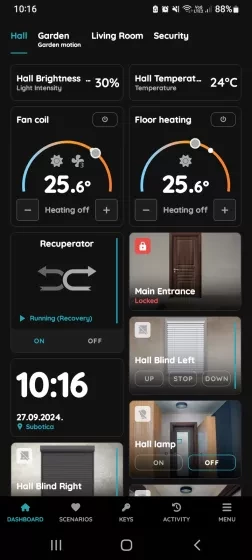On this page
The Brightness Sensors feature in the Smart PIERRE app provides effective monitoring for ambient light levels. Users can manage the Brightness sensor from both the Dashboard and the Menu.
Key benefits of the Brightness sensor include:
1. Light Intensity Level Visibility:
- The Brightness sensor shows the current level of light intensity, which is visible on the Dashboard, allowing users to monitor and respond to changes in ambient light.
2. Long Press for Advanced Options:
- A long press on the sensor icon provides access to the Edit and Used In tabs. The Edit tab allows users to customize the sensor’s name and picture, while the Used In tab shows all automations where the sensor is included.
3. Automation Integration:
- Brightness sensors can be integrated into various automations to enhance comfort and energy efficiency. For example, if the level of light intensity is higher than 65%, the system can automatically turn Off the lights in the living room to save energy.
The Brightness Sensors feature integrates seamlessly with the PIERRE smart home system, ensuring optimized lighting control and energy efficiency based on real-time conditions.
This sensor shows light intensity.

Follow the example of the Hall Brightness sensor.
It shows light intensity of 30 %.
To edit the Brightness sensor settings follow next few steps.

Open I/O list, scroll to the Brightness sensors and tap the card of the one you would like to edit.

Edit the following form:
- Name - Edit the name of the Brightness sensor.
- Photo - Choose the source of the photo.
Tap the Submit/Done.
GOOD TO KNOW:
Brightness sensor can be edited by long-press the Brightness sensor card on the Dashboard or tapping it in the I/O list.

Tap photo of the Brightness sensor.
You have three options:
- Open Library - This opens the phone’s Library.
- Open Camera - Take a picture using your smartphone.
- Choose Default Image - These images are prepared in advance in order to provide a complete and seamless experience.
- Remove image - Removes existing image.
The Used In tab shows all the scenarios and automations where the Brightness sensor is applied. If it isn't used in any, the list will be empty, and a message will display: "This I/O is not in use anywhere." This feature is particularly useful as it consolidates all relevant information in one place.

In this case, this Hall Brightness sensor is used for automation of Hall lamp.
You can create scenario for the Blinds/Curtains from Taskbar or from the Menu.
Creating a scenario for the Blinds/Curtains is important because it allows seamless automation, improving convenience, energy efficiency, and security. Scenarios can adjust multiple Blinds/Curtains simultaneously based on time, weather, or light levels, helping to personalize your smart home experience and reduce the need for manual control. In this case automation is created based on the Brightness sensor in case when it detects level of light intensity lower than 75 %.

Tap on the Scenarios on the Taskbar.
Scenarios page will be open.

Tap on the button Add in order to create Scenario.

Fill following form:
- Name – Enter the name of the Scenario.
- Role – Select the appropriate role for the Scenario.
- Photo – Choose a photo to represent the Scenario.
- Slide to confirm – When enabled, you will be asked to confirm the operation to avoid accidental actions.
- Icon – Select an icon for the Scenario.
- Add a new I/O – Tap this field to add new I/Os to the Scenario.
Tap Submit/Save to finalize your changes.

Select checkbox/checkboxes next to the desired Role/Roles (multiple choice).
Tap Save/Done.

Tap the photo of the Scenario. You have three options:
Open Library - The phone’s Library will open.
Open Camera - You can take a picture using your smartphone.
Choose default image - These images are prepared in advance in order to provide a complete and seamless experience.

You can search I/Os if you tap in the field Search and write the name of the I/O that you want to find, or to tap on the filter icon in the up right corner of the Search bar.
Tap on the checkbox/checkboxes next to the desired I/Os that you would like to add to the Scenario from the I/Os to Set in Scenario list.
Under each of the I/Os on this list is shown its current status.
The statuses are always those that have been set, and they can be changed later by tapping on the I/O.
Tap Save.

Find Scenario Hall Blinds down and tap its card.

Tab Edit is selected.
Tap on the tab Automation.

Tap on +Add new Automation.

There is possibility to add:
- New Time condition,
- New Delay,
- Existing I/O.
Tap on the Existing I/O.

Scroll to Brightness sensors on the list and tap on the desired I/O from the list, in this case Hall Brightness sensor.

Hall Blinds down scenario will be activated when Hall Brightness sensor shows light intensity smaller than 75%.
You can use slider to set the desired light intensity or use Presets (tap desired one).
Tap the Save button.

To confirm settings of the Automated Scenario tap the button Done.

The Slide to confirm feature adds an extra layer of security, requiring you to confirm your action before activating the scenario. This helps prevent scenarios from being triggered accidentally.
To activate the Automated Scenario manually, tap on the card of the desired Scenario, use button Slide to Activate and slide from left to the right side.
The icon of the Automated Scenario gets blue, and status is changed to Active.

